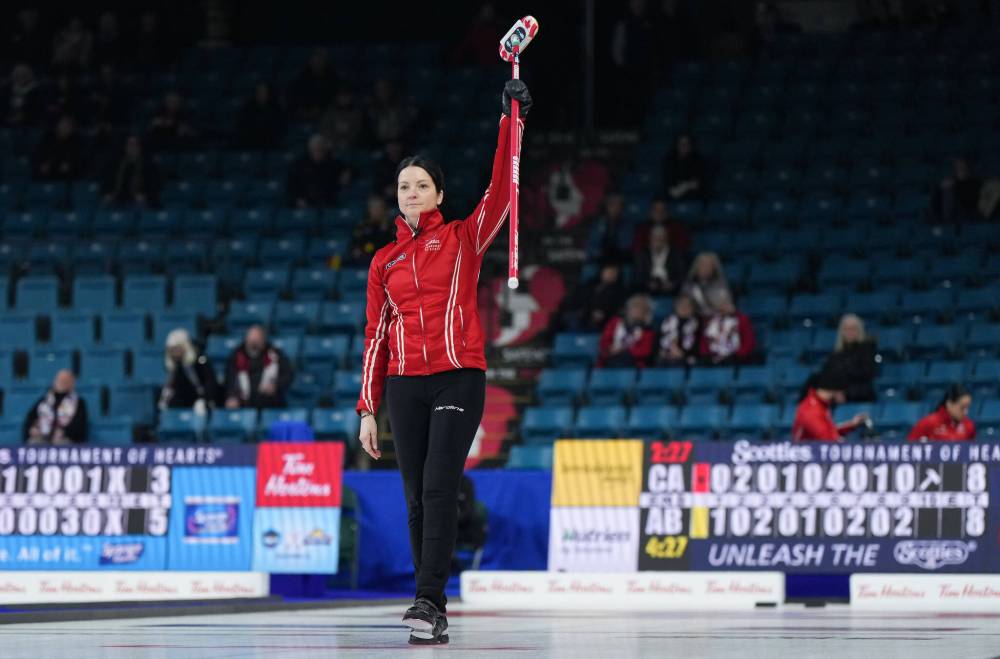Women in sports subjected to sexist trolling
Read this article for free:
or
Already have an account? Log in here »
To continue reading, please subscribe:
Monthly Digital Subscription
$1 per week for 24 weeks*
- Enjoy unlimited reading on winnipegfreepress.com
- Read the E-Edition, our digital replica newspaper
- Access News Break, our award-winning app
- Play interactive puzzles
*Billed as $4.00 plus GST every four weeks. After 24 weeks, price increases to the regular rate of $19.00 plus GST every four weeks. Offer available to new and qualified returning subscribers only. Cancel any time.
Monthly Digital Subscription
$4.75/week*
- Enjoy unlimited reading on winnipegfreepress.com
- Read the E-Edition, our digital replica newspaper
- Access News Break, our award-winning app
- Play interactive puzzles
*Billed as $19 plus GST every four weeks. Cancel any time.
To continue reading, please subscribe:
Add Winnipeg Free Press access to your Brandon Sun subscription for only
$1 for the first 4 weeks*
*$1 will be added to your next bill. After your 4 weeks access is complete your rate will increase by $0.00 a X percent off the regular rate.
Read unlimited articles for free today:
or
Already have an account? Log in here »
Hey there, time traveller!
This article was published 06/04/2023 (908 days ago), so information in it may no longer be current.
After Kerri Einarson and her teammates Val Sweeting, Shannon Birchard and Briane Harris won a bronze medal representing Canada at the World Women’s Curling Championship in Sandviken, Sweden, Ms. Einarson did an interview with Postmedia — not about her team’s achievement, but rather the misogynistic abuse slung at her online.
People who will never represent this country on the world stage for anything took it upon themselves to pick apart Einarson’s appearance, make inappropriate remarks about her Métis heritage, as well as the fact that the team’s uniforms bore the logo of the Manitoba Métis Federation, a sponsor.
And these aren’t isolated incidents. When her team won at the Scotties last year Ms. Einarson received a call at work from someone who thought it was “disgusting” for her to be away from her children and that she’s a “terrible curler” and a “horrible mom.”
The abuse is not isolated to Ms. Einarson, either. Someone once told Ms. Sweeting they’d cheer for her if she had straighter teeth.
“People write us and comment on a female’s looks, their tattoos, their haircut, their makeup, their voice, and nobody has ever written to me to talk about how a certain male athlete looks… And I find it deeply disturbing because there seems to be kind of a feeling out there that it’s OK,” Curling Canada CEO Katherine Henderson told the Free Press. “There’s a standard out there somewhere that someone’s made up around women that it’s a free-for-all and you can say whatever you want about their appearance.”
Women whose work brings them into the public eye know it can feel like open season on their bodies and voices, which many facets of society still seek to control and silence — through reproductive control, through diet culture, take your pick. Women’s bodies are, too often, treated as public property to be commented upon, evaluated and ranked.
And the objectification of women and girls is merely the first stop on a terrible tour that often concludes in abuse and violence.
And our girls are listening. They see the abuse being levelled at female athletes. They hear the comments about how “no one watches women’s sports” or mouldy chestnuts about running/throwing/existing “like a girl,” as though being a girl is inferior. They are internalizing these messages. As a result, they are self-selecting out of sport.
A 2020 report from Canadian Women and Sport found that one in three girls leaves sport by her late teens, as compared with one in 10 boys.
DARRYL DYCK / THE CANADIAN PRESS Kerri Einarson
One in three girls in the study reported low self-confidence, negative body image, perceived lack of skill and feeling unwelcome as factors preventing them from continuing in sport. Other barriers include lack of support and visibility for girls’ teams.
That means girls are missing out on all the positive benefits of participation in sports, such as the development of collaborative teamwork and leadership skills, physical health and confidence.
Ms. Einarson should be applauded for calling out these trolls. Men’s curling teams need to call this behaviour out, too. Online abuse doesn’t stay online; it has real-world implications.
Ms. Einarson has twin nine-year-old daughters who have been bitten by the curling bug. It would be a shame if they ever felt as if they couldn’t follow their dreams because of sexist bullies with Wi-Fi connections.









